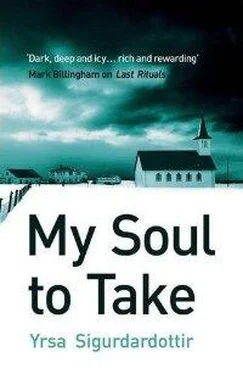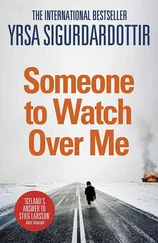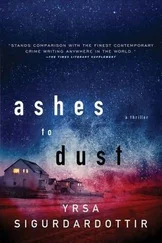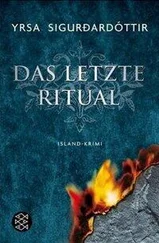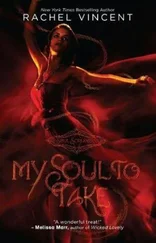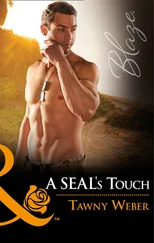Thóra picked up the diary and started reading. At a loss for an answer to his remark, she pretended to absorb herself in a page she opened at random. It turned out to be the plan for the building site and Birna’s comments. “What’s wrong with this spot??? Old plans???” She scrutinized the two pages, then moved on when she noticed nothing new. On the next page was written “Maybe the rock?” After it was “There must be plans—talk to Jónas.”
Thóra stood up and walked over to the window. It offered a view of the area that had interested Birna so much, and Thóra wanted to see if anything about it caught her eye. She pulled back the curtain and looked over the grass. The land was fairly level and seemed to Thóra like an ideal plot for construction. She consulted the previous pages in an attempt to work out the location of the annex. It was on the east side of the hotel area, far enough away not to obstruct the view from the rooms that had already been built.
“There’s nothing wrong with that land,” she said, more to herself than to Matthew. “It’s just an ordinary lawn. The grass needs cutting, though.” She squinted. Sticking up from the green grass as it rippled in the wind was a large gray rock. “Come on,” she said to Matthew, tugging at the corner of the duvet. “Get dressed. We have to go and look at a rock.”
“And you dragged me out of bed for this?” complained Matthew, looking around. They were standing in the tall grass in the meadow behind the hotel. “It’s just grass,” he said.
“I’m not interested in the grass,” said Thóra as she bent over the rock protruding from the green expanse. “I want to look at this.”
“Oh, well, in that case, I understand completely,” he said as he walked over to where she was. He shook his head. “It’s a gray stone, Thóra,” he said. “You don’t need to touch it to confirm that.”
“Yes, but it doesn’t belong here,” Thóra told him, pushing the grass away from it. It was triangular, like a huge piece of Toblerone. “Look around you,” she said, “do you see other rocks in the meadow?”
“No,” conceded Matthew after glancing around. “The plot thickens,” he added sarcastically.
“Seriously, though,” Thóra said, looking up from where she knelt. “People went to great lengths to clear the rocks out of meadows in the old days. Why would they leave behind a huge rock in the middle of it?”
“Because it was too heavy?” he suggested, squatting down beside her. “Or could it be an enchanted elvish rock?”
Thóra shook her head. “No, they were much larger rocks; boulders, really.” She stood up and went around to the other side of the rock. “I’m no expert, but I think this side has been smoothed down. Look.” Matthew followed her around the rock and saw that she was right. On the other side the surface was rough and uneven, but here the stone appeared to have been sawn or cut, and then polished. Thóra ran her palm over it. “Look at that,” she said, excited. “There’s something carved in it.” She pushed the long grass away and they saw a worn inscription in the middle of the rock.
“What does it say?” Matthew asked.
Thóra bent down closer and peered at the inscription. Her first thought was that it was a gravestone, but she soon saw that a verse had been carved into it, not a name and dates. She read out:
Kerns I should have cast,
A farm was meant for me,
I should have been wed,
Just like thee.
“What does it mean?” Matthew asked eagerly. “Is it something significant?”
Thóra leaned back from the rock. “I don’t know really,” she said. “It looks like a verse, but I don’t understand it entirely. There’s a word here whose meaning I’m not sure of.” Thóra bent back down to the stone to make sure that she had definitely read the word “kerns” correctly. She stood back up. “I wonder if this is what bothered Birna about the meadow?”
“This rock?” He laughed. “I doubt it. It’d be easy to remove, so I can’t see that it would have prevented the land being developed.” He looked back across the meadow. “This is a perfectly ordinary patch of grass with a rock in it. Perhaps the verse is by a farmer who had a high opinion of his own poetry. There may have been a flower bed or a pet’s grave here. Is the verse anything to do with animals?”
“No,” Thóra said, standing up. “ ‘Kerns,’ ” she said thoughtfully. “Could it be that the word I thought was ‘keens’ in Birna’s diary was this word?”
“Search me,” said Matthew. “Why do you think it hasn’t been mown here?” he asked suddenly, looking down. The grass was so thick that he couldn’t see his shoes.
“What?” Thóra said. “Why should it be? It’s great like this. Natural.”
“In the meadow at the other end of the hotel, the grass has been mown,” Matthew pointed out.
“Actually, you’re right.” She pointed at a little brown mound of dirt close to them. “What’s this?” she asked, going to look at it.
“Is there no end to your powers of detection?” said Matthew as they peered down at the low pile. “Look, you found some dirt.”
“I know it’s dirt,” Thóra said. “The question is, what’s it doing on top of the grass?”
Matthew looked around. “It looks as if someone has been digging in the meadow,” he said. “There are more heaps of dirt here and there.”
“What’s the explanation? Could it be connected with the hotel annex?” She started walking away. “Maybe Vigdís at reception knows, and she might also know why this patch has not been mown.”
“You can ask her at the same time if she knows whether Birna had somewhere to work other than her room,” Matthew said as he followed her.
She turned around, grinning. “Are you beginning to think I’m on the right track?”
Matthew smiled enigmatically back. “You’re as far off the track as a cross-eyed racehorse.”
Vigdís was sitting at her place at reception, but her cheeks were flushed and feverish, her eyes glassy, and her hands trembling. She was so distracted that she didn’t notice them until they resorted to clearing their throats loudly. She jumped and finally looked up, open-mouthed. Then she slammed down the telephone receiver she had been staring at. “Jesus Christ!” she said, and shuddered.
“Is everything okay?” asked Thóra.
Vigdís looked up at her, wide-eyed. “No, it most certainly is not,” she answered, her voice quavering. “Everything is so far from being okay that I really don’t know what to say.”
“What happened?” Thóra asked anxiously. “There wasn’t another body found, was there?”
“No, there wasn’t,” Vigdís answered. “I just heard who it was who died in the stables.” Her cheeks grew redder. “It was Eiríkur,” she said, shaking her head sadly.
“Eiríkur?” repeated Thóra. “Who’s he?”
“Who was he,” Vigdís corrected her. “We have to get used to talking about him in the past tense. God, this is weird. First Birna, and now Eiríkur.”
“And he is … ?” Thóra repeated, then hastened to correct herself. “Was, I mean.”
“He was the aura reader at the hotel here,” Vigdís replied. “A tall guy, thin, going bald.” She moaned. “This is unbelievable.”
Thóra relayed the news to Matthew. Not knowing the German word for “aura,” she tried to mime it, which Matthew in turn mistakenly interpreted as a halo. Impatiently, Thóra said she would explain his field of work later. She turned her attention back to Vigdís. “How do you know this?” she asked. “Did someone call you?”
“Yes,” whimpered Vigdís. “His sister. They found a credit-card receipt in his pocket and traced the name. They phoned her and asked her to come and identify the body. She was his next of kin. The body’s in Reykjavík now.” She sighed as if that were the worst thing about the whole matter. “His sister was completely devastated. She said he’d been trampled to death.”
Читать дальше
